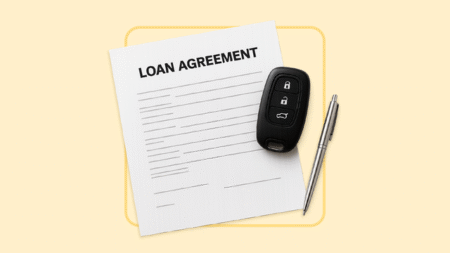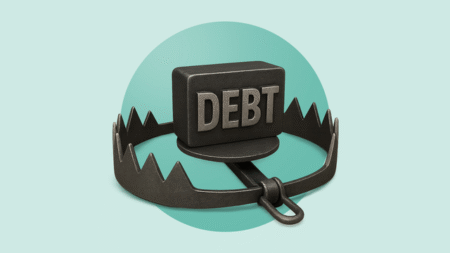Key takeaways
- Debt settlement means negotiating with creditors to pay less than what you owe, often in a lump sum.
- While it can provide relief, debt settlement can also come with major risks — including credit score damage and potential tax liability.
- You can attempt debt settlement on your own or work with a third-party company, but this should be a last resort.
- Alternatives like consolidation or even bankruptcy can be better fits depending on your situation.
Debt can pile up fast — and when you’re drowning in balances you can’t afford, it’s easy to feel trapped. Debt settlement is a strategy where you negotiate with creditors to pay less than you owe, usually through a lump sum payment.
It might sound like a financial lifeline, but it’s not a quick fix — and can come with serious trade-offs.
Before you go down this road, it’s crucial to understand how debt settlement works, whether you should try it yourself or hire professional help and what safer alternatives are available.
What is debt settlement, and why do people use it?
Debt settlement — sometimes called debt relief — happens when you and a creditor agree to settle your debt for less than the full amount owed. This can involve reducing the principal or interest in exchange for a lump-sum payment.
It’s typically only an option when:
- You’re more than 90 days past due
- You’ve struggled for a long time to pay down your debts.
- You’re suffering financial hardship and can’t pay what you owe.
- You’ve exhausted other repayment options.
- You can set aside money for a lump-sum payment.
- Bankruptcy won’t help your situation.
For many, debt settlement looks like a way out. But it’s rarely fast or easy and often comes with long-term financial and credit consequences. Before considering settlement, weigh it against other options like credit counseling or bankruptcy, which may offer better long-term outcomes.
Pros and cons of debt settlement
It’s important to understand both the upsides and serious risks before moving forward.
Benefits of debt settlement
- Reduce your total debt: Settle for less than the amount you owe, potentially saving thousands.
- Avoid bankruptcy: If you don’t qualify or want to avoid bankruptcy, settlement can be a workable (albeit costly) alternative.
- Stop calls from creditors: A successful settlement may bring an end to creditor harassment. Note that you have rights and protections against creditors.
- Faster resolution: If you have cash on hand, you could resolve your debt faster than through long-term repayment plans.
Risks of debt settlement
- Credit score damage: Missed payments and settled accounts stay on your credit report for up to seven years.
- No guarantees: Creditors aren’t required to settle — they may reject your offer or take legal action instead.
- Tax consequences: Forgiven debt over $600 is usually taxed as income.
- High fees: If you use a debt settlement company, you could pay 15 percent to 25 percent of your enrolled debt in fees.
- Stress and uncertainty: The process can take years, with no guarantee of success, and can worsen your financial position if negotiations fail.
How to do your own debt settlement
If you want to avoid paying fees to a debt settlement company, you can negotiate your own debt settlement.
1. Assess your financial situation
- List your debts (including creditor’s name), total amount owed, interest rates and payment statuses
- Figure out how much you can realistically offer — most creditors will expect 40 to 60 percent of the total owed, so use this as a guideline when determining your offer.
2. Contact your creditors
- Contact your creditors directly. Start by calling their customer service line and requesting to speak with a representative who handles hardship cases or settlements.
- Ask about hardship plans before jumping to settlement.
- If you move forward, explain that you’re unable to pay in full but can offer a reduced lump sum payment.
3. Negotiate terms
- Start low (for example, offer 30 percent if you can afford 50 percent) to leave room for negotiation.
- Ask about any fees or tax implications.
- After you’ve reached an agreement, request a written confirmation of the terms before making any payments.
4. Make the payment
- Follow the agreed-upon terms, whether it’s a single lump sum or a series of installments.
- Use a secure method, such as a cashier’s check or electronic transfer, and keep records of all payments
- Once the payment is completed, verify with the creditor that the account has been closed and settled
- Monitor your credit report to ensure the account is updated accurately
How to choose and work with a reputable debt settlement company
If you know you’re a poor negotiator or don’t have the time or patience to deal with every creditor, another option is to work with a third-party debt settlement company. That company will contact creditors on your behalf and attempt to strike an agreement that works for both sides.
Here are the steps to pick the right one:
- Research the company’s track record: Look for a long-established company with verifiable reviews or ratings. Be wary of newer companies.
- Look for accreditations: There are numerous accreditations for debt settlement companies. The American Association for Debt Resolution audits members to ensure they follow regulations. Also, be sure your counselor is certified by the International Association of Professional Debt Arbitrators.
- Ask smart questions: Make sure there aren’t upfront fees — under federal law, companies can’t charge fees until they’ve settled or reduced at least one debt. Also, when you ask about costs and the word “commissions” comes up, that could be a red flag. Commissions signify that your “counselor” is a salesperson who is likely in it for the money rather than to help resolve your debt. That’s probably not someone who will work in your best interests.
- Avoid unrealistic promises: No company can guarantee results, so be skeptical if they make promises that seem too good to be true.
Alternatives to debt settlement
Debt settlement isn’t the only option for managing overwhelming debt. Depending on your financial situation, most alternatives may be more effective or less risky. Here are some common options to consider.
Credit counseling
Nonprofit credit counseling agencies can help you assess your finances, negotiate with creditors and create a debt management plan (DMP) — all without hurting your credit score. This is often the safest place to start.
Debt management plan (DMP)
A debt management plan is a structured repayment program typically offered through credit counseling agencies. With a DMP, the agency works with your creditors to lower interest rates and consolidate your payments into one monthly amount. This option helps you stay organized and pay off your debts over time, usually within three to five years, without the negative impact on your credit score that comes with debt settlement.
Debt consolidation
Debt consolidation involves combining multiple debts into a single loan with a lower interest rate or more manageable monthly payments. You can achieve this through a personal loan, a balance transfer credit card or a home equity loan. While it doesn’t reduce the total amount owed, it simplifies repayment and can save money on interest. This option works best if you have a steady income and decent credit.
These options are generally only available to people with higher credit scores. If you suspect your debts may soon become unmanageable, it’s best to look into this option early.
Bankruptcy
Filing for bankruptcy is a legal process that provides relief from overwhelming debts, either by liquidating your assets (Chapter 7) or creating a repayment plan (Chapter 13). While bankruptcy can offer a fresh start, it has significant long-term consequences for your credit and financial stability.
However, compared to debt settlement, you can start rebuilding your credit right away instead of waiting months or years to try to fix things. Bankruptcy also guarantees lenders that you can’t file again in a certain period, unlike with debt settlement
Negotiating lower interest rates
If you’re struggling with high-interest debt and have good credit, consider negotiating directly with creditors to lower your interest rates. This can make monthly payments more affordable without needing to settle the debt for less than the full amount. A simple phone call explaining your financial hardship may result in better terms.
Increase your income or cut expenses
Sometimes, the best solution is to boost your financial capacity. Look for ways to increase your income, such as taking on a side job, freelancing or selling unused items. At the same time, evaluate your budget to identify areas where you can cut back on expenses. Using the extra funds to pay down your debts can help you regain control without resorting to settlement.
Bottom line
Debt settlement can help reduce what you owe — but it comes at a cost. Between credit score damage, tax implications and potential fees, it should only be used when all other options are off the table.
If you pursue settlement, start by assessing your finances and deciding whether to negotiate on your own or work with a reputable company. Be prepared for setbacks, protect your credit where you can and document everything thoroughly.
More often than not, you’ll be better off with alternatives like credit counseling, debt consolidation or even bankruptcy. Whatever you decide, the important thing is to take action on your debt.
Frequently asked questions
Read the full article here

















